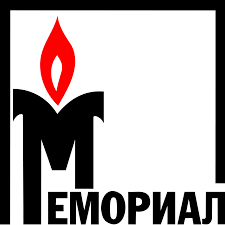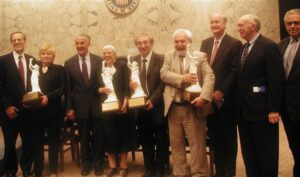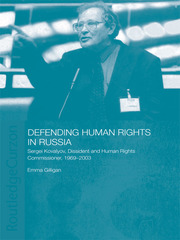 Memorial called Kovalev’s death “an irreparable loss,” the Post adds. The organization has been under severe pressure from Russian authorities after being declared a foreign agent in 2016.
Memorial called Kovalev’s death “an irreparable loss,” the Post adds. The organization has been under severe pressure from Russian authorities after being declared a foreign agent in 2016.
Russia’s first Chechen war, from 1994 to 1996, created an enduring rift with President Yeltsin, a onetime ally, as Kovalev rejected the government’s attempts to explain and justify the conflict, the Times adds:
In a public letter of resignation from President Yeltsin’s Human Rights Commission, published in 1996 in The New York Review of Books, he accused the Russian leader of making decisions that “have revived the blunt and inhumane might of a state machine that stands above justice, law and the individual.”
“Only you are in a position to stop this senseless war,” he wrote to Yeltsin in December 1994. “Every day, with our own eyes, we see the planes bombing residential buildings. Every day we see the corpses of peaceful civilians, fragments of people, some without heads and others without legs.”
Kovalyov was an equally staunch critic of Vladimir Putin’s authoritarianism.
“Putin has in effect created a myth of the imperial state,” he wrote in 2007, “a myth derived from elements of pre-revolutionary Russian history and the Soviet past — that serves as a substitute for historical memory.”
 Kovalev’s was a mentor to and close associate of leading democracy advocates, including human rights lawyer Mara Polyakova, a recipient of the National Endowment for Democracy’s 2004 Democracy Award (right).
Kovalev’s was a mentor to and close associate of leading democracy advocates, including human rights lawyer Mara Polyakova, a recipient of the National Endowment for Democracy’s 2004 Democracy Award (right).
U.S. Senator John McCain presented Kovalev and Elena Bonner with the NED’s Democracy Award in 1995, and Kovalev’s video message to the NED’s Sakharov centennial event in May was his last public statement.
He was an architect of the All-Russian Extraordinary Congress in Defense of Human Rights, which convened more than 1,000 activists for the largest gathering of its kind in the history of Russia in January 2001, The Journal of Democracy reported. The event, responding to concerns that basic rights and freedoms guaranteed by the Russian constitution were under increasing threat, was organized by major Russian human rights organizations, including the Andrei Sakharov Foundation, the Moscow Helsinki Group, Memorial, the “Za Prava Cheloveka” Foundation, and the Glasnost Defense Foundation.
Sergei Kovalev, well-known and admired as a stalwart defender of fundamental rights who always spoke his mind and never compromised on principles, died in Russia today, aged 91. Watch HRW’s interview with him, recorded in 2011. @hrw https://t.co/T3Q8L5sdDI
— Tanya Lokshina (@TanyaLokshina) August 9, 2021

 His parents sought to implant “the practice of silence and acquiescence” instilled in many Soviet citizens by Stalinist purges, according to Emma Gilligan, an Australian scholar and author of “
His parents sought to implant “the practice of silence and acquiescence” instilled in many Soviet citizens by Stalinist purges, according to Emma Gilligan, an Australian scholar and author of “





